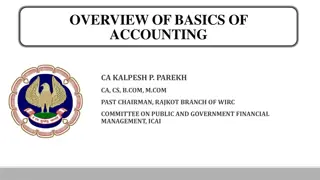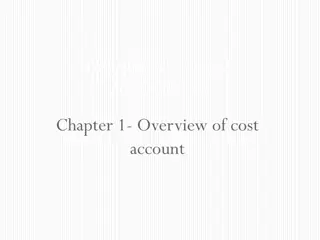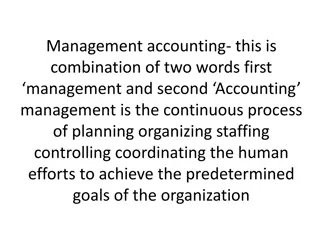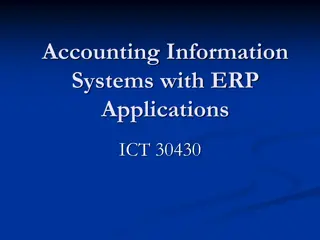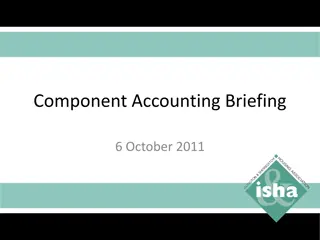European Developments in Public Sector Accounting: Lessons Learned
This presentation delves into the sovereign debt crisis in Europe, highlighting its causes and lessons learned. It discusses the role of the public sector in relation to the private sector's performance, the impact of political systems on public sector accounting reforms, and the need for a harmonized accrual-based accounting system in the European public sector.
Download Presentation

Please find below an Image/Link to download the presentation.
The content on the website is provided AS IS for your information and personal use only. It may not be sold, licensed, or shared on other websites without obtaining consent from the author.If you encounter any issues during the download, it is possible that the publisher has removed the file from their server.
You are allowed to download the files provided on this website for personal or commercial use, subject to the condition that they are used lawfully. All files are the property of their respective owners.
The content on the website is provided AS IS for your information and personal use only. It may not be sold, licensed, or shared on other websites without obtaining consent from the author.
E N D
Presentation Transcript
European developments in public sector accounting Lessons learned Thomas M ller-Marqu s Berger 18 November 2014
Agenda 1. The sovereign debt crisis: causes and lessons learned 2. Role of the public sector for the performance of the private sector 3. Public sector accounting reforms: impact of the political system Role of public sector Impact of political system Sovereign debt crisis Page 2
The sovereign debt crisis: causes and lessons learned Page 3
The sovereign debt crisis: causes and lessons learned Background and causes Macroeconomic factors: Weak actual and potential growth in the EU Competitive weaknesses (e.g. wages and pension commitments in Greece) and weaknesses in the governance of banks (e.g. Spain) Large debt-to-GDP-ratios Downgrading of PIGS-states by rating agencies European banks own a significant amount of sovereign debt Entity-level factors: Considerable liability stock (government, private, and non-private sector) Non-harmonized micro-level public-sector accounting data (public sector accounting varies even within EU countries!) Limitations of cash-based information Greek government revised deficit forecasts several times European Union currently is a currency union and not a fiscal union! Role of public sector Impact of political system Sovereign debt crisis Page 4
The sovereign debt crisis: causes and lessons learned Lessons learned Problems: Lack of comparability of Member States accounting Incoherence between government accounting and finance statistics European Commission has recognized that: Fiscal transparency is necessary for macroeconomic stability, surveillance and policy Harmonization of public sector accounting at micro level leads to better fiscal data (GFS) at macro level Current public sector accounting of some Member States is identified as significant weakness Solution: Development of harmonized accrual-based accounting/ financial reporting system for the public sector in Europe. Role of public sector Impact of political system Sovereign debt crisis Page 5
The sovereign debt crisis: causes and lessons learned Plans for an European accounting reform (1) Main findings of the European Commission s Report on the suitability of IPSAS (2013) Report recommends a single set of harmonized accruals-based accounting standards at all levels of government throughout the EU IPSASs in their current status cannot be simply implemented in EU Member States However, IPSASs represent an indisputable reference framework for potential EU harmonized accruals-based public sector accounts (so-called European Public Sector Accounting Standards, EPSAS ) PwC study (2014): most governments are relatively positive about using IPSAS as a primary reference for developing EPSAS . Role of public sector Impact of political system Sovereign debt crisis Page 6
The sovereign debt crisis: causes and lessons learned Plans for an European accounting reform (2) How Europe wants to achieve reliable and timely financial information for sound government policies: European Commission intends to set-up strong governance structure for the development of EPSAS Development of a Conceptual Framework light Discussions around standards (EPSAS) vs. principles (EPSAP) EPSAS light for smaller and less risky entities Reform focus solely on accounting/financial reporting Role of public sector Impact of political system Sovereign debt crisis Page 7
The sovereign debt crisis: causes and lessons learned Plans for an European accounting reform (3) Advantages and benefits of the proposed plans: Accruals as sound basis for GFS purposes Accrual accounts by government entities are audited => reliable basis for decision-making Complete overview on assets and (contingent) liabilities Accrual information shows service potential embodied in public infrastructure Depreciation/impairment shows use of assets Improvement of and focus on business-relevant processes Provides a complete financial overview of an entity through consolidated financial statements Better decision-making in terms of spending policies as well as taxation policies => Austrian example Role of public sector Impact of political system Sovereign debt crisis Page 8
The sovereign debt crisis: causes and lessons learned Austrian experiences with implementing IPSAS Spending policies Focus is on organizational and operative decisions (e.g. make-or- buy decisions based on full cost) Discussion of the life cycle cost of infrastructure (e.g. Eurofighter) Risk management, e.g. provisions for the costs of litigation Overview of all obligations (e.g. obligation to preserve tunnel system from 2nd World War) => contract management Better management of transfers (e.g. investment grant) Taxation policies Accrual information as a basis for planning future tax revenues Better management of tax revenues (e.g. matching of planned tax revenues against actual tax revenues => efficiency in tax collection) Role of public sector Impact of political system Sovereign debt crisis Page 9
The sovereign debt crisis: causes and lessons learned Accrual budgeting Lack of adequate information for decision-making in the context of budget planning as main driver for accrual budgeting Embedding the accruals principle in budgeting contributes to better public management and decision-making Budgeting decisions and political execution decisions are made against the background of the potential accounting impact Debt and contract management Financing aspects especially relevant for long-term investments in infrastructure Less complexity if budgets and accounts are fully aligned Improved risk management Can be implemented after accrual accounting reform (phased implementation) Role of public sector Impact of political system Sovereign debt crisis Page 10
Role of the public sector for the performance of the private sector Page 11
Role of the public sector for the performance of the private sector Relationship between government financing and economic growth Government s access to global capital markets and financing conditions Determines the scope of action Investments by governments in infrastructure etc. Economic growth in private sector Role of public sector Impact of political system Sovereign debt crisis Page 12
Role of the public sector for the performance of the private sector The importance of fiscal transparency for governments financing conditions at capital markets Source: INTERNATIONAL MONETARY FUND paper: Fiscal Transparency, Accountability, and Risk , Prepared by the Fiscal Affairs Department in collaboration with the Statistics Department August 7, 2012 The degree of fiscal transparency has been shown to be an important predictor of a country s fiscal credibility and performance. Role of public sector Impact of political system Sovereign debt crisis Page 13
Role of the public sector for the performance of the private sector Effects of the sovereign debt crisis on the private sector? % Eurozone: Unemployment rates % Eurozone: Government spending growth year-on-year 3.0 14.0 2.5 12.0 2.0 10.0 1.5 8.0 1.0 6.0 0.5 4.0 0.0 2.0 2008 2009 2010 2011 2012 2013 2014 -0.5 0.0 -1.0 2008 2009 2010 2011 2012 2013 2014 Eurozone: GDP % year Annual change (LHS) % quarter 4 2.0 3 1.5 2 1.0 Quartely change (RHS) 1 0.5 0 0.0 -1 -0.5 -2 -1.0 -3 -1.5 -4 -2.0 -5 -2.5 -6 -3.0 2007 2008 2009 2010 2011 2012 2013 2014 Source : Oxford Economics/Haver Analytics Role of public sector Impact of political system Sovereign debt crisis Page 14
Role of the public sector for the performance of the private sector Relationship between fiscal transparency and economic growth Fiscal transparency Government s access to global capital markets and financing conditions Investments by governments in infrastructure etc. Economic growth in private sector It is not about accounting - it is about improving people s lives by holding governments to account to deliver on their obligations without hiding the facts about who will pay for them. Role of public sector Impact of political system Sovereign debt crisis Page 15
Public sector accounting reforms: impact of the political system Page 16
Public sector accounting reforms: impact of the political system Public sector accounting in Germany vs. France Germany Heterogeneous Federal: cash-basis State: mainly cash Local: mainly accrual France Homogeneous All government entities in France apply accrual accounting Consistent accounting policies for all French public administrations Simple structure One standard setter for all levels of government (CNoCP: Conseil de normalisation des comptes publics) Public sector accounting landscape Standard setting framework Complex structure One standard setter at federal/state level but additional laws; ministries of interior of each state in charge of local governments Clearly below average IPSAS compliance according to EY study Clearly above average Role of public sector Impact of political system Sovereign debt crisis Page 17
Public sector accounting reforms: impact of the political system Lessons learned Politicians need to make more use of the information provided by accrual data For successful accounting reforms political support is required Different legal backgrounds (common (case) law vs. civil law) influences the standard setting approach The standard-setter needs to have sufficient power Principles/standards need to be binding Public sector accounting standards does not need to differ between levels of governments Role of public sector Impact of political system Sovereign debt crisis Page 18





